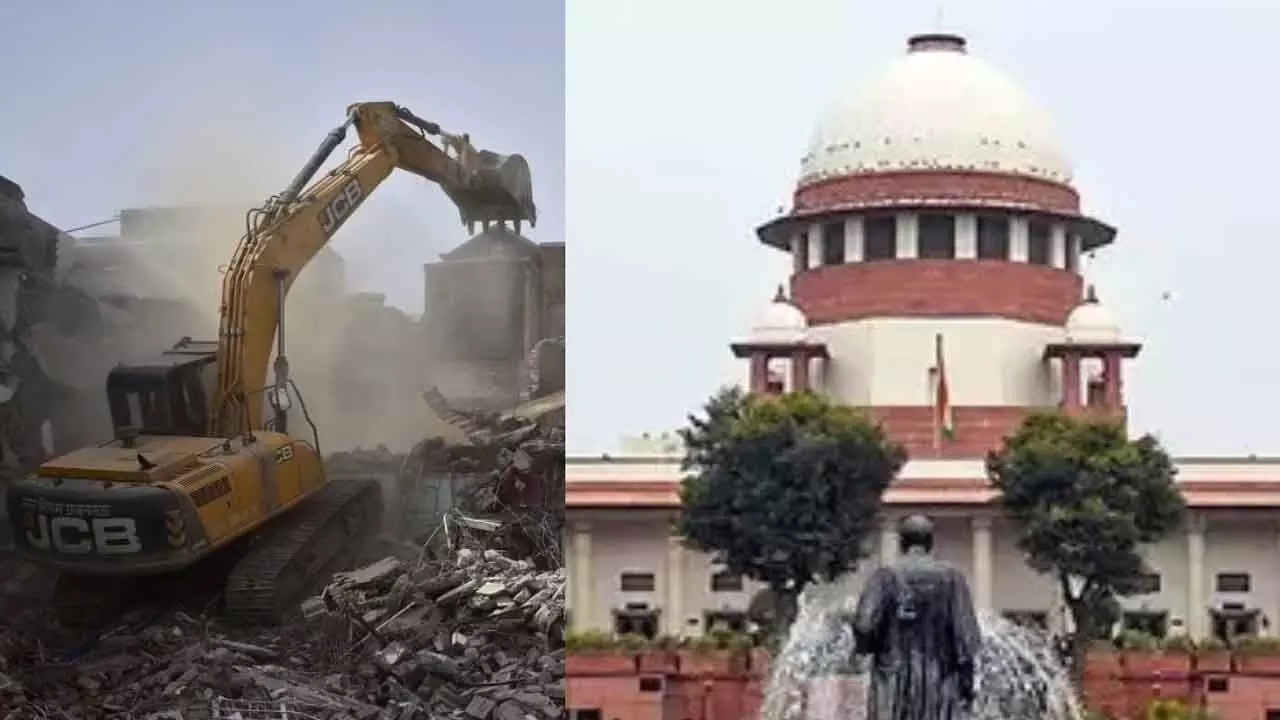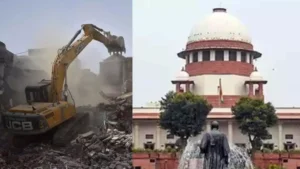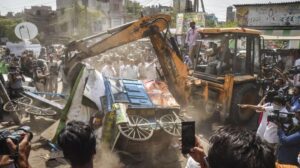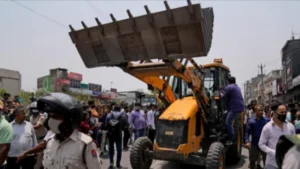
SC halts Bulldozer Demolitions Nationwide
Supreme Court Halts Demolitions Without Permission
On Tuesday, September 17, 2024, the Supreme Court of India issued a crucial directive, halting all demolitions across the country until October 1. This ruling is set to affect bulldozer actions unless specific permission is obtained from the court. The decision was made by a bench comprising Justices BR Gavai and KV Viswanathan, emphasizing that illegal demolitions go against the principles of the Indian Constitution.

Applicability of the Supreme Court Order
While the Supreme Court halts demolitions, it clarified that this directive does not apply to all encroachments. Specifically, illegal structures on public roads, footpaths, railway lines, or waterbodies can still be subject to demolition without needing the court’s prior permission. This is an important distinction, as many unauthorized constructions on these spaces continue to disrupt public infrastructure.
The Court scheduled the next hearing on the matter for October 1, giving both the authorities and affected parties time to present their cases.

Justification for the Order
The Supreme Court’s decision to halt demolitions is part of its broader concern over the misuse of bulldozer actions across the country. The Court stressed that demolitions as a form of punishment, especially in the absence of due process, violate fundamental rights under the Indian Constitution.
Justice BR Gavai highlighted that even a single instance of illegal demolition is unacceptable under India’s constitutional framework. The Court’s ruling aligns with its ongoing efforts to ensure that administrative actions, such as demolitions, respect the rule of law and fundamental rights.

Objections from the Solicitor General
During the proceedings, the Solicitor General of India, Tushar Mehta, raised objections to the Supreme Court‘s decision. He argued that the order could restrict the statutory powers of municipal and state authorities, leaving them unable to act against unauthorized structures. Mehta expressed concerns that halting all demolitions might tie the hands of authorities and create governance challenges.
However, the Supreme Court countered these objections, remarking that “heavens won’t fall” if demolitions are paused for a brief period. The Court stressed the importance of legal due process and the protection of individual rights, even if it temporarily delays municipal actions.
Supreme Court Criticizes “Glorification” of Bulldozer Actions
The Supreme Court also addressed the growing trend of using bulldozers as a form of public spectacle, calling it a form of “glorification” or “grandstanding.” The Court remarked that such actions undermine the principles of justice and warned against any attempts to use demolitions for political or symbolic gain.
In fact, the apex court hinted at involving the Election Commission of India if bulldozer actions were being manipulated for political purposes. This statement highlights the Court’s concern about the potential misuse of state power during election periods, where demolitions could be portrayed as an attempt to maintain law and order, often without legal backing.
Concerns Over Misuse of Municipal Laws
One of the key issues raised during the hearing was the misuse of municipal laws to carry out demolitions. The Court stressed that both unauthorized occupants and authorities should not exploit loopholes in these laws to their advantage. This balanced stance shows that while the Supreme Court halts demolitions, it is not protecting illegal encroachments but ensuring that demolitions are conducted according to the law.
Municipal authorities often use their powers to demolish structures deemed unauthorized, but the Court made it clear that such actions should be carried out with legal backing, rather than as punitive measures against individuals or communities.
The Jahangirpuri Case: A Turning Point
The Supreme Court halts demolitions amid ongoing concerns about cases like Jahangirpuri, where bulldozer actions led to the destruction of homes after the riots in April 2022. The petition, filed by Jamiat Ulema-i-Hind, alleged that houses were demolished without due process, targeting individuals based on allegations of inciting riots.
The petition argued that these demolitions violated the right to a home, which is considered part of the right to life under Article 21 of the Indian Constitution. Jamiat Ulema-i-Hind further requested that the demolished houses be reconstructed, emphasizing that bulldozer actions should not be used as a tool for punishment.
The Jahangirpuri case has become a focal point for discussions on how authorities use demolition drives, particularly in sensitive areas or following public unrest. The Supreme Court’s interim decision to stop demolitions highlights the importance of safeguarding citizens’ rights, even in complex legal and political contexts.
SC Considers Pan-India Guidelines on Demolitions
In earlier proceedings, the Supreme Court also contemplated creating nationwide guidelines to regulate the demolition of properties belonging to individuals accused of criminal activities. These guidelines would aim to ensure that even unauthorized constructions are demolished strictly in “accordance with the law.”
This is a significant move because it reinforces the idea that demolitions cannot be carried out arbitrarily or as a punitive measure. The Court made it clear that demolishing the property of an accused individual, or even a convicted one, should not be the norm without proper legal authorization.
Balancing Rule of Law and Accountability
While the Supreme Court halts demolitions temporarily, its intention is not to protect illegal structures indefinitely. The Court clarified that unauthorized buildings must still face legal scrutiny. However, the focus is on ensuring that demolitions follow due process and that no one—be it the accused or the government—takes undue advantage of loopholes in the system.
The key takeaway from the Court’s ruling is the emphasis on balance. Authorities must remain accountable for their actions, ensuring they do not infringe upon individuals’ constitutional rights, while at the same time maintaining order by addressing encroachments lawfully.
Conclusion: Protecting Rights, Ensuring Legal Action
The Supreme Court halts demolitions across India in an effort to uphold the constitutional ethos of justice and fairness. This ruling ensures that demolitions, often used as punitive actions, cannot take place without prior legal authorization. The Court’s intervention sends a strong message that bulldozer actions should not be misused, especially in politically charged environments.
At the same time, the Court is clear that unauthorized structures must still face legal consequences, as long as demolitions occur within the framework of the law. As the case progresses, the focus remains on creating guidelines that ensure a just and balanced approach to the sensitive issue of demolitions in India.
Disclaimer: The content in this article is based on publicly available information and legal proceedings. Legal decisions and interpretations may evolve, and readers are encouraged to seek official sources for the latest updates.


